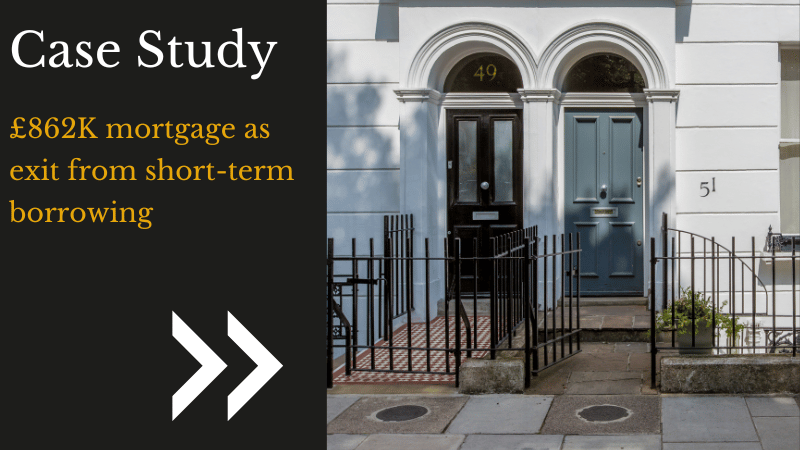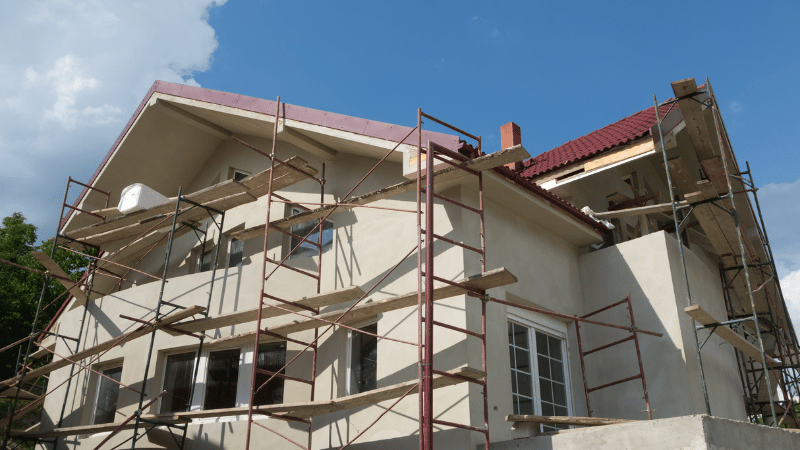Categories
Chain Break Finance - The Bridging Loan Solution

The collapse of a property chain can be incredibly frustrating for those purchasing a new property – buyers are left stuck without funds, unable to sell their existing property.
Chain breaks happen often and are typically outside the control of the burned party – when a buyer pulls out, an offer is withdrawn, plans are put on hold, and homebuyers are left stranded.
Thankfully, there are options available for these circumstances – chain break finance, otherwise known as a bridging loan, can fill the funding gap and allow borrowers to purchase a property before their existing property has sold.
In this brief guide, we'll look at chain break finance, what it entails, how to apply, how much it'll cost, and, ultimately, to what extent a bridging loan of this type can resolve your broken property chain.
Skip to:
How can bridging finance help?
Are there alternative options for a property chain break?
How much can you borrow with chain break finance?
How long will it take to get funds from a bridge loan?
How do I apply for chain break finance?
Need advice with a property chain break?
What is chain break finance?
Chain break finance is a bridging loan that borrowers can use when a property chain breaks down.
- A property chain is a sequence of linked property purchases, where the sale of each property depends on the sale of the previous property.
- When a buyer pulls out of a property purchase, it can cause a domino effect, affecting all the other sellers in the chain.
When a buyer pulls out of a property purchase, it can significantly impact the rest of the chain. It may leave other sellers unable to fund their original plans if they cannot sell their property.
This is where chain break finance can be helpful. It allows borrowers to quickly access funds, which can help them continue with a property purchase, even if their original property still needs to be sold.
Bridging loans can be arranged within a few weeks or even quicker if needed.
So they allow you to secure the purchase you've had your hopes set on, and then repay your bridging loan later when your property does eventually sell.
Bridging loans typically have a term of 12 months, giving you plenty of time to sell your property and still get a good price for it.
Although bridging loan interest is higher than a standard mortgage, you'll only pay it for as long as you use the loan for.
So if your house sells in 3 months, you'll only pay 3 months of interest.
You can also opt to secure a bridging loan both against your current property and the one you're buying - this means your lender has twice the security and can offer you a lower rate in some cases.

Fergus Allen
Head of Bridging
Let us do all the hard work of finding the right bridging lender for your circumstances.
We secure bridging finance for applications of all types, and we negotiate competitive lending to meet your needs and timescale.
Why do property chains break?
A property chain can break for various reasons, including:
- The seller has a change of mind about selling the property.
- Buyers may not be able to secure mortgage funds.
- A new buyer offers a higher price, and the seller starts a new chain.
- Someone in the property chain claimed to own or sell the property, i.e. fraud or misrepresentation.
Working with a reputable estate agent and solicitor is essential to minimise the risk of a chain break. During a property chain break, exploring alternative options, such as bridging finance, renting, or selling your property before buying, can be helpful.
How can bridging finance help?
Bridging loans are commonly used as a solution for a property chain break due to the speed at which they can be organised, and they're an ideal option when other forms of finance prove to be too slow.
With a bridge loan, a buyer can quickly bridge the gap in funding for their dream property while allowing for the necessary time to sell their old property.
Bridge loans are secured loans, which means your exit strategy is tied into the eventual sale of the property that secured the loan – you'll pay back the loan via the sale proceeds, typically within 12 months, depending on the terms.
With the help of an expert broker, you can find a favourable rate on the best possible bridge loan for a property chain break scenario. We'll help negotiate with lenders and review your options – for buyers, this can take a lot of the stress out of the situation.
Are there alternative options for a property chain break?
While bridging finance is perhaps the best option for this circumstance, it is worth reviewing all your options. Chain break bridge finance may not be suitable for your current financial circumstances.
Bridge loans can be expensive – with additional costs involved and higher interest rates applied than a mortgage. There are ways to mitigate these costs and methods to find a suitable bridge loan with favourable rates, but some people may wish to review all their options before looking into bridge finance.
Here are a few examples of alternative finance and other options:
- Negotiating a longer completion date with the seller to allow more time to find a new buyer for your property.
- Consider a different financing option, such as a personal loan or holding off a sale to increase your mortgage instead, allowing for a more sizable deposit for a future property purchase.
- Renting out your current property and using that income to help finance the purchase of a new property.
- To avoid a property chain in the first place, you may look to purchase properties that are not part of a chain – new builds or properties sold by developers.
How much can you borrow with chain break finance?
With a bridge loan, you'll be made a cash buyer with the option to act on a property transaction that previously slipped away during the property chain break.
How much you'll be able to borrow will depend on various factors. As a general rule, bridge loans of this type range from 65% to 80% LTV (Loan-To-Value), and they can go higher depending on additional securities or assets offered as collateral.
This means you'll be able to borrow a percentage of the securities' value - for example, 80% of your current property's value. When you have the cash from the loan, you can continue with your original property transaction.
Notably, there are no absolute upper limits to the amount you can borrow. Still, you'll need to show lenders that any given loan taken out will be affordable and suitable for your circumstances – essentially, if you have the security/assets to back the loan, then you'll have no issue purchasing the dream home you had your eye on during the property chain break.
How long will it take to get funds from a bridge loan?
Property chain breaks are stressful, and finding a solution becomes a time-sensitive ordeal.
That is why borrowers in this particular circumstance need funding quickly to plug the gap between transactions – or they'll risk losing the property they had their eye on before the property chain break.
Bridge loans are short-term financing solutions designed to resolve these finance gaps for property transactions.
With that said, chain break finance can be organised relatively quickly – depending on the case's complexity–and with an expert broker's help, you can bridge the gap in your finances within several working days or weeks.
An application may take some time to process, or if the loan amount is more significant – this may require more time to organise, for instance. Lenders will also have to carry out their valuation of the property you wish to use as security, which can potentially take time. However, with this said, in most cases, finance can be organised incredibly quickly compared to more traditional means of property financing.
How do I apply for chain break finance?
Bridging loans are available to anyone who meets the basic criteria; individuals, limited companies, partnerships etc. and for residential property purchases, the requirements for applying are not dissimilar from applying for a mortgage – often, applying for a bridge loan requires less stringent checks against the borrower in comparison to a mortgage.
To successfully apply, you must fulfil a lender's eligibility requirements, which can vary from lender to lender.
All you'll need is the necessary documentation and information, such as proof of income, details of the property you want to purchase, and information on the property to use as security.
Borrowers will benefit from seeking help from expert brokers who can handle the process and application on your behalf.
Need advice with a property chain break?
Are you in need of expert guidance for a property chain break? – Here at Clifton Private Finance, our experienced team can assist in navigating your options, whether you're new to bridging loans or have prior experience with this type of financing.
When it comes to significant financial decisions, seeking the help of a bridging loan expert is always recommended. Our team can ensure you receive finance at an affordable and favourable rate.
Contact us today at 0117 959 5094 to learn how we can assist you, or book a consultation below.
FAQs
Can I still get chain break finance if I'm self-employed?
If you're self-employed and looking for a bridge loan, it is still possible to apply – you may be subject to more scrutiny. Lenders will have different eligibility requirements for bridge finance, and you may have to provide additional documentation to prove income, i.e. tax returns. It may be a good option to shop around for bridge loan providers and to check terms carefully to see if a lender will provide a loan when factoring in self-employment. A bridge loan broker can help with this.
Will my credit score be affected by a bridge loan?
Any loan taken out will be noted in your credit history, and if a bridge loan is defaulted on, your credit score and future ability to receive finance of any type will be affected. It could affect your ability to apply for a mortgage, for instance.
What is the repayment period of a bridging loan?
Bridge loans are short-term (starting anywhere from 3 months right up to 36 months), and the repayment period is far shorter than your standard mortgage. This can add pressure if you're unprepared for expensive interest rates and additional costs, so it is crucial to seek assistance throughout the process of applying for bridging finance – to make sure you can afford a loan of this type.













